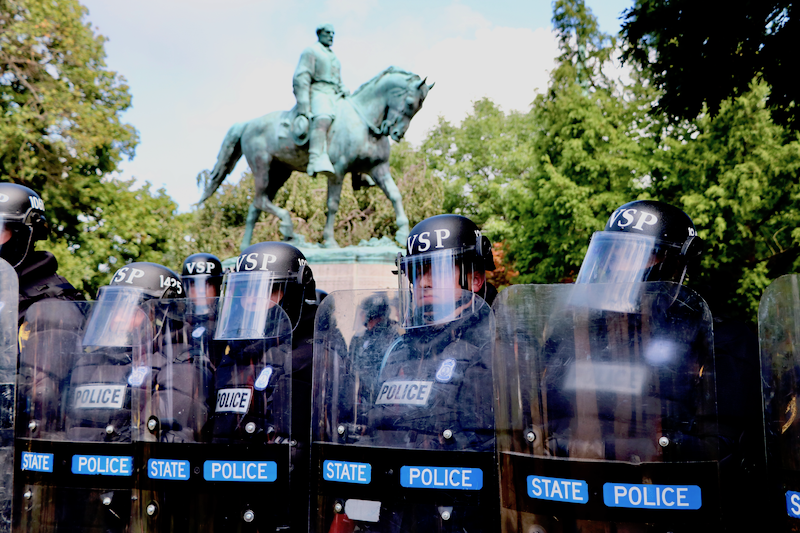The debate over removing Confederate statues hit a potential roadblock yesterday. A circuit-court judge in Charlottesville handed down a ruling signaling that the Commonwealth’s laws protecting war memorials could be retroactively applied to Virginia’s Confederate monuments. This ruling effectively allows the lawsuit filed by groups such as Virginia Division of the Sons of the Confederate Veterans to move forward. However, Judge Richard Moore imposed a caveat and gave the groups filing the lawsuit 21 days to prepare a more in-depth argument that a statue dedicated to a single military personage – such as Robert E. Lee – counts as a war memorial.
The lawsuit was filed after Charlottesville’s city council voted to remove statues glorifying Confederate Generals Lee and Jackson earlier this year. At the same time, according to NBC 29, Moore also ruled that shrouds covering the statues of Lee and Jackson will remain in place for the time being. Charlottesville shrouded their statues after the events of Unite the Right on August 12, which left three people dead.

Emancipation Park during Unite the Right. Photo by Landon Shroder
Obviously this case will set a precedent throughout the Commonwealth, as cities and counties continue to grapple with the fate of their own Confederate statues and symbols. This debate has been especially fierce in places with highly visible statues, such as Norfolk and Portsmouth; along with Richmond, where Mayor Stoney’s Monument Avenue Commission will resume sometime this month.
The debate over public displays of Confederate monuments and symbols gained momentum after a summer of white nationalist, supremacists, and alt-right rallies in Charlottesville. These rallies, claiming to protect “heritage,” became a visible strategy for white nationalist groups to extend their message and outreach through the issues surrounding Confederate statues. This culminated on August 12 at the Unite the Right rally, the largest public gathering of white supremacists in decades, which took place in the shadow of the Lee statue at Emancipation Park. Violence at the rally was wide-spread and ultimately left one dead and 30 wounded in a terrorist attack perpetuated by a white supremacist.

Unite the Right. Photo by Landon Shroder
Regardless, the statues remain contentious throughout the Commonwealth. According to a poll released at the end of September by Mason-Dixon Polling & Strategy, 52 percent of all Virginians oppose removing statues commemorating Confederate generals, while 62 percent oppose the removal of monuments memorializing the war dead. In Richmond, a poll conducted by the Richmond Times Dispatch and Christopher Newport University released yesterday found that a majority of local residents are against removal, but support planning to add additional historical context.

Virginia Politics Sponsored by F.W. Sullivans



